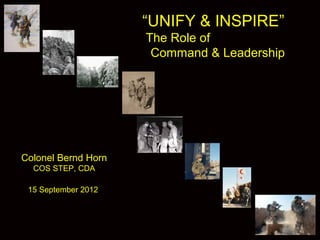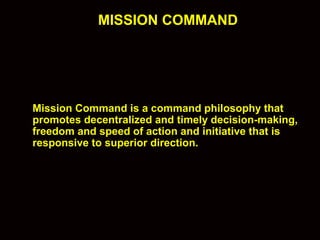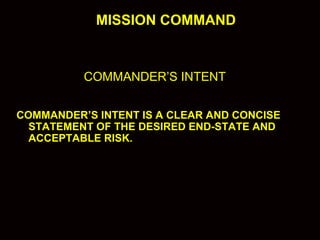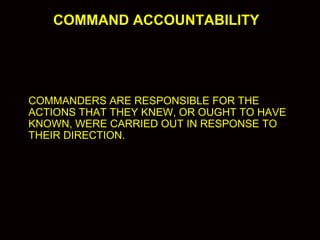Unify inspire horn - 15 sep
- 1. ŌĆ£UNIFY & INSPIREŌĆØ The Role of Command & Leadership Colonel Bernd Horn COS STEP, CDA 15 September 2012
- 2. DEFINITION - COMMAND ŌĆ£the authority vested in an individual of the armed forces for the direction, co-ordination, and control of military forces.ŌĆØ NATO DEFINITION
- 3. UNDERSTANDING COMMAND COMMAND AUTHORITY MANAGEMENT LEADERSHIP
- 4. AUTHORITY NDHQ Authority, which encompasses a legal and constitutional component (e.g. National Defence Act), is always derived from a higher or superior entity.
- 5. MANAGEMENT Management is designed to control complexity and increase group effectiveness and efficiency. It is also based on formal organizational authority and it is unequivocally results orientated. Its emphasis is on the correct and efficient execution of organizational processes.
- 6. LEADERSHIP ŌĆ£DIRECTING, MOTIVATING AND ENABLING OTHERS TO ACCOMPLISH THE MISSION PROFESSIONALLY AND ETHICALLY, WHILE DEVELOPING OR IMPROVING CAPABILITIES THAT CONTRIBUTE TO MISSION SUCCESS.ŌĆØ CF DOCTRINAL DEFINITION
- 7. Leadership Philosophy Situationally Appropriate Influence Effective Influence Behaviours Transformational Leadership an tive ted - t e re n ive on - iv ri ori eme tive i -a rita as pa a ti ort zf d se se rsu ec leg i tho pp v rtic en hie ba is D ir Pe Su De Au Pa La Ac Total Zero control control
- 8. ROLE OF UNIT LEADERSHIP 1. ENSURE MISSION ACCOMPLISHMENT 2. CONTROL / ALLOCATE RESOURCES 3. CREATE POSITIVE UNIT / LEADERSHIP CLIMATE - TRUST - ENCOURAGE INITIATIVE - FAIRNESS - TEAMWORK - RISK ACCEPTANCE
- 9. WORKING WITH OTHERS ŌĆō 10 PRINCIPLES 1. Be Patient; 2. Be adaptable and manage your expectations; 3. Recognize that actions speak louder than words; 4. Appreciate that perception is more important than reality; 5. Remember that the message sent is not always the message that is Received and it is the message that is received that is acted on;
- 10. WORKING WITH OTHERS ŌĆō 10 PRINCIPLES 6. See the world through the eyes of those with whom you are interacting; 7. Do not judge the behaviours of others and, instead, observe, learn and try to understand; 8. Always be respectful; 9. Deal with frustrations privately; and 10. Do not adhere to unrealistic standards.
- 11. QUESTIONS ?
- 12. MISSION COMMAND Mission Command is a command philosophy that promotes decentralized and timely decision-making, freedom and speed of action and initiative that is responsive to superior direction.
- 13. MISSION COMMAND COMMANDERŌĆÖS INTENT COMMANDERŌĆÖS INTENT IS A CLEAR AND CONCISE STATEMENT OF THE DESIRED END-STATE AND ACCEPTABLE RISK.
- 14. MISSION COMMAND THREE ENDURING TENETS: 1. the importance of understanding a superior commanderŌĆÖs intent; 2. a clear responsibility to fulfil that intent; and 3. timely decision-making.
- 15. MISSION COMMAND FUNDAMENTALS OF MISSION COMMAND: 1. unity of effort; 2. decentralized authority; 3. trust; 4. mutual understanding; and 5. timely and effective decision making.
- 16. COMMAND ACCOUNTABILITY COMMANDERS ARE RESPONSIBLE FOR THE ACTIONS THAT THEY KNEW, OR OUGHT TO HAVE KNOWN, WERE CARRIED OUT IN RESPONSE TO THEIR DIRECTION.
Editor's Notes
- THANK ORGANIZERS EXPLAIN CHOICE OF TITLE SLIDE ŌĆō CDN MILITARY LEGACY & ROLE OF CADETS AND RESERVE IN THAT
- CDN ADOPTED / ACCEPTED DOCTRINAL DEFINITION OF COMMAND ITS ABOUT MISSION ACCOMPLISHMENT ŌĆō CONTROL OF RESOURCE QUICKLY WISH TO EXPLAIN THE CONCEPT WANT TO START WITH A COMMON STARTING POINT - COMMAND
- COMMAND VERY PERSONALITY CENTRIC ŌĆō BIG DIFFERENCES BETWEEN COMMANDERS NOT AN ARBITRARY ACTIVITY ŌĆō MUST BE APPOINTED AMAZINGLY LOTS OF MISUNDERSTANDING PEOPLE USE COMMAND, LEADERSHIP, AUTHORITY, MANAGEMENT, SUPERVISION ŌĆō INTERCHANGEABLY OFTEN CONFUSE ONE WITH THE OTHER THREE DISTINCT COMPONENTS TO COMMAND ŌĆō AUTHORITY ŌĆō MANAGEMENT ŌĆō LEADERSHIP NO MISTAKE - ALL THREE ARE NEEDED ŌĆō ESSENTIAL TO UNDERSTAND THAT BUT HOW ONE BALANCES THE THREE ŌĆō EMPHASIS PLACED WILL DETERMINE STYLE
- ALWAYS RELY ON AUTHORITY TO IMPOSE WILL NOT BEST METHOD RELIANCE ON RANK AND POSITION WILL NEVER BUILD A COHESIVE, EFFECTIVE UNIT THAT WILL WITHSTAND THE TEST OF CRISIS. VERY RARELY INSPIRES PEOPLE SOMETIMES HAVE TO USE IT ŌĆō DONŌĆÖT BE AFRAID TO USE. WHEN REQUIRED.
- IT IS PRIMARILY CONCERNED WITH THE ALLOCATION AND CONTROL OF RESOURCES (I.E. HUMAN, FINANCIAL AND MATERIAL) TO ACHIEVE OBJECTIVES. ITS FOCUS IS STAFF ACTION SUCH AS: ALLOCATING RESOURCES, BUDGETING, COORDINATING, CONTROLLING, ORGANIZING, PLANNING, PRIORITISING, PROBLEM SOLVING, SUPERVISING AND ENSURING ADHERENCE TO POLICY AND TIMELINES.
- HUMAN SIDE DEALS WITH THE PURPOSE OF THE ORGANIZATION ŌĆō ŌĆ£DOING THE RIGHT THINGŌĆØ VERSUS ŌĆ£DOING IT RIGHT [MANAGEMENT]. LEADERSHIP ŌĆō OLD UNDERSTANDING ŌĆō INDUSTRIAL MODEL ŌĆō COMPLETE TASK ŌĆō GOOD LEADERSHIP LEADERSHIP ŌĆō ONLY VALID IF THOSE FOLLOWING BESTOW LEADERSHIP ON YOU. ITS ABOUT INSPIRING, MOTIVATING ŌĆō GETTING INDIVIDUALS TO FOLLOW YOU WILLINGLY ITS ABOUT INFLUENCING PEOPLE TO ACHIEVE A MUTUALLY BENEFICIAL OBJECTIVE
- LEADERSHIP EXERCISED THROUGH A SPECTRUM OF INFLUENCE ACTIVITIES BASED ON SITUATION (E.G. INEXPERIENCED, TIRED, FRIGHTENED) / FOLLOWERS
- A LEADER EXERCISES COMMAND THROUGH THE FORCE OF PERSONALITY AND LEADERSHIP TO INFLUENCE THE ATTITUDE, DIRECTION AND MOTIVATION OF SUBORDINATE S. A LEADERŌĆÖS ABILITY TO CREATE AN EFFECTIVE AND POSITIVE COMMAND CLIMATE HAS A DIRECT IMPACT ON THE MORALE AND LEVEL OF PERFORMANCE OF THE PERSONNEL WITHIN THE ORGANIZATION. POSITIVE LEADERSHIP, SINCERITY AND COMPASSION BY THE LEADER STIMULATES SUBORDINATE CONFIDENCE, ENTHUSIASM, MUTUAL TRUST AND TEAMWORK. IN ADDITION, ENCOURAGEMENT TO THINK INDEPENDENTLY, USE INITIATIVE AND ACCEPT RISK, AS WELL AS INCLUSION OF STAFF AND SUBORDINATES IN THE DECISION MAKING PROCESS ALL ASSIST IN CREATING AN EFFECTIVE COMMAND CLIMATE.
- DEFINITION IS CLEAR ŌĆō ITŌĆÖS THE EXECUTION THAT IS ALWAYS PROBLEMATIC BASICALLY ŌĆō ASSIGN SUBORDINATES A MISSION PROVIDE CONSTRAINTS AND LIMITATIONS AND LET THEM GET ON WITH IT TELL THEM WHAT IS TO BE DONE ŌĆō NOT HOW TO DO IT YOU WILL BE SURPRISED BY INITIATIVE AND CREATIVITY / INNOVATION EASIER SAID THAN DONE
- CI IS THE COMMANDERŌĆÖS PERSONAL EXPRESSION OF WHY AN OPERATION IS BEING CONDUCTED AND WHAT HE HOPES TO ACHIEVE BY IT. ITS STRENGTH IS THE FACT THAT IT ALLOWS SUBORDINATES TO EXERCISE INITIATIVE IN THE ABSENCE OF ORDERS, OR WHEN UNEXPECTED OPPORTUNITIES ARISE, OR WHEN THE ORIGINAL CONCEPT OF OPERATIONS NO LONGER APPLIES. IT MUST BE CLEAR TO SUBORDINATES (NOT JUST IN YOUR OWN MIND ŌĆō CLARITY IS ALWAYS A PROBLEM). ŌĆ£ I NEED YOU TO TAKE CARE OF THE PROBLEMŌĆØ - ŌĆ£NEED YOU TO GET RID OF THE ENEMY.ŌĆØ
- mission command is situational. It does not apply to all people or situations. While micro-management and / or rigid superfluous direction may cause resentment and stagnation of creativity and initiative, a lack of direction can produce little effect. Subordinates must be well-trained and possess the ability and skill to be able to execute decentralized tasks. Junior, inexperienced or subordinates provided by some coalition forces may not be capable of exercising mission command. Equally, some situations, such as immediate crises, that demand decisive, quick action may also not lend themselves to mission command.
- EVERY MILITARY PROFESSIONAL, AS AN INDIVIDUAL, IS RESPONSIBLE FOR THEIR ACTIONS AND THE DIRECT CONSEQUENCES OF THOSE ACTIONS. COMMANDERS ARE RESPONSIBLE TO MAKE DECISIONS, ISSUE ORDERS AND SUPERVISE THE CONDUCT OF THEIR PERSONNEL. THE LEGAL AUTHORITY VESTED IN COMMANDERS NECESSITATES SUBORDINATES TO ADHERE TO THE LAWFUL COMMANDS OF THEIR SUPERIORS. BUT THE COMMANDER WHO GIVES THE ORDERS MUST ACCEPT RESPONSIBILITY FOR THE CONSEQUENCES THAT FLOW FROM THE EXECUTION OF THEIR ORDERS..
















